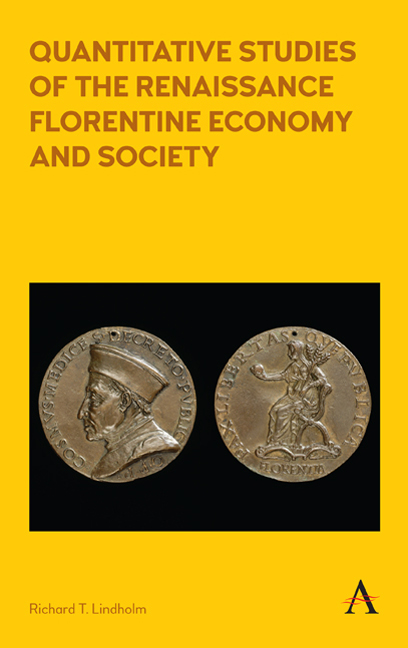Book contents
- Frontmatter
- Dedication
- Contents
- List of Illustrations
- Preface
- Acknowledgments
- List of Abbreviations
- Introduction
- Part I RISKS AND RETURNS
- Part II SOCIETY
- Chapter Three The Chances of Getting Rich in Renaissance Florence: The Wool Industry Occupational Wealth Hierarchy
- Chapter Four Palaces and Workers: Neighborhood Residential Segregation in Renaissance Florence
- Chapter Five The “State” Makes a Work of Art: The Impact of the Catasto Homeowner Tax Loophole on the Quattrocento Florentine Palazzo Building Boom
- Chapter Six Not Getting Ahead in Life: The Lack of Life-Cycle Wealth Accumulation in Quattrocento Tuscany
- Part III WORK
- Conclusion
- Glossary
- Bibliography
- Index
Chapter Six - Not Getting Ahead in Life: The Lack of Life-Cycle Wealth Accumulation in Quattrocento Tuscany
from Part II - SOCIETY
Published online by Cambridge University Press: 10 January 2018
- Frontmatter
- Dedication
- Contents
- List of Illustrations
- Preface
- Acknowledgments
- List of Abbreviations
- Introduction
- Part I RISKS AND RETURNS
- Part II SOCIETY
- Chapter Three The Chances of Getting Rich in Renaissance Florence: The Wool Industry Occupational Wealth Hierarchy
- Chapter Four Palaces and Workers: Neighborhood Residential Segregation in Renaissance Florence
- Chapter Five The “State” Makes a Work of Art: The Impact of the Catasto Homeowner Tax Loophole on the Quattrocento Florentine Palazzo Building Boom
- Chapter Six Not Getting Ahead in Life: The Lack of Life-Cycle Wealth Accumulation in Quattrocento Tuscany
- Part III WORK
- Conclusion
- Glossary
- Bibliography
- Index
Summary
Introduction
One of the bedrock empirical relationships in modern economics is that, except under rare circumstances, earnings, income and wealth increase as one ages. Beyond the obvious economic implications, this relationship has important social implications. Alberti's treatise on the family recognizes the importance of age when he assigns the father the leadership of the family. The economic advantage of elders over juniors provides both the older a higher status and the younger an aspiration. This relationship appears entirely natural; older people can simply become richer if they are able to store their wealth over time. Natural economic production above subsistence level would seem to take care of the rest. Similarly, earnings and income increase by age if people build up their workplace skills over time. Research based on data from the nineteenth century and later confirms this relationship, but a lack of data has impeded work on earlier periods.
This chapter presents evidence of negligible life-cycle wealth accumulation in Quattrocento Tuscany in a series of steps. It begins by discussing the relevant economics literature. Next, it presents the results of the basic statistical analysis using data from the 1427 Florentine catasto. Expanding on this, it attempts to determine whether problems with the data reduced the association between age and wealth. This analysis finds that none of these potential problems were significant. The final step extends the basic analyses above. First, it looks at the implied relationship between household size, wealth and age. Most historians accept that Quattrocento Tuscany was a Malthusian society; both wealth and age are strongly and positively associated with household size. This would normally imply, in turn, that wealth, age and household size are closely related due to transitivity. This section looks at the underlying mathematics that might create a lack of transitivity and examines possible explanations. Second, it starts from the joint assumptions that, despite the analyses and tests in part two, some portion of the household's wealth was unreported and that the standard modern model of life-cycle wealth accumulation holds. It then uses these assumptions to develop a simulation to measure how much wealth would have been unreported had the life-cycle wealth accumulation profile matched that of modern America. The unreported wealth seems too large to rehabilitate the standard modern model.
- Type
- Chapter
- Information
- Publisher: Anthem PressPrint publication year: 2017



